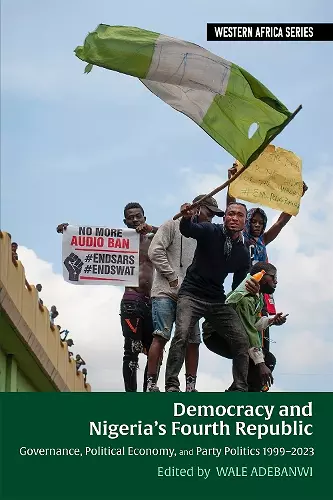Democracy and Nigeria’s Fourth Republic
Governance, Political Economy, and Party Politics 1999–2023
Format:Hardback
Publisher:James Currey
Published:19th Sep '23
Currently unavailable, and unfortunately no date known when it will be back

'Today we are taking a decisive step on the path of democracy,' the newly sworn-in President Olusegun Obasanjo told Nigerians on 27 May 1999. 'We will leave no stone unturned to ensure sustenance of democracy, because it is good for us, it is good for Africa, and it is good for the world.' Nigeria's Fourth Republic has survived longer than any of the previous three Republics, the most durable Republic in Nigeria's more than six decades of independence. At the same time, however, the country has witnessed sustained periods of violence, including violent clashes over the imposition of Sharia'h laws, insurgency in the Niger Delta, inter-ethnic clashes, and the Boko Haram insurgency. Despite these tensions of, and anxieties about, democratic viability and stability in Nigeria, has democratic rule come to stay in Africa's most populous country? Are the overall conditions of Nigerian politics, economy and socio-cultural dynamics now permanently amenable to uninterrupted democratic rule? Have all the social forces which, in the past, pressed Nigeria towards military intervention and autocratic rule resolved themselves in favour of unbroken representative government? If so, what are the factors and forces that produced this compromise and how can Nigeria's shallow democracy be sustained, deepened and strengthened? This book attempts to address these questions by exploring the various dimensions of Nigeria's Fourth Republic in a bid to understand the tensions and stresses of democratic rule in a deeply divided major African state. The contributors engage in comparative analysis of the political, economic, social challenges that Nigeria has faced in the more than two decades of the Fourth Republic and the ways in which these were resolved - or left unresolved - in a bid to ensure the survival of democratic rule. This key book that examines both the quality of Nigeria's democratic state and its international relations, and issues such as human rights and the peace infrastructure, will be invaluable in increasing our understanding of contemporary democratic experiences in the neo-liberal era in Africa.
This book is the most comprehensive, dispassionate and critical evaluation of the trials and tribulations of Nigeria's democratic development in the Fourth Republic, undertaken by some of the most distinguished scholars on/of Nigeria. Fresh insights are offered by the contributors, towards a better understanding of the complex issues which constrain or obstruct progress and development, and which require the most urgent consideration and resolution. Reading this book is intellectual exciting and immensely beneficial. * Attahiru Jega, professor of political science and former Chairman of Independent National Electoral Commission (INEC) *
Nigeria's Fourth Republic has lasted longer than its three predecessors combined, yet it is highly contested. What explains the paradox? Wale Adebanwi has assembled a dream team of scholars and analysts to explore key issues in government, politics, and public affairs: federalism, ethnicity, elections, human rights and economy. The contributors to this important volume explain the dynamics of party politics and the evolution of the federal system without major constitutional revision. During a period of heightened instability in west Africa, and global challenges such as the pandemic, Russia-Ukraine war, rising fuel and food prices, and climate change, much depends on the resilience of Africa's largest electoral democracy. An extensive bibliography complements the chapters in this vital sourcebook on Africa's pivotal nation. * Richard Joseph, author of Democracy and Prebendal Politics: The Rise and Fall of Nigeria’s Second Republic *
ISBN: 9781847013514
Dimensions: unknown
Weight: 776g
464 pages